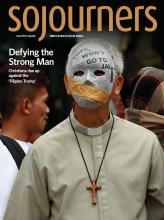JAPANESE DIRECTOR Hirokazu Koreeda tells delicate, exquisite tales—small stories that invite huge responses. They hold expansive space in which human beings can see what we really are—a little lower than the angels, deciphering what it is to live between the steeple and the gargoyle.
Koreeda’s early film After Life imagines death being followed by a week of decision during which the deceased are invited to choose the memory they wish to live in forever. It takes place mostly in a nondescript office building, in which ghosts and bureaucrats talk over desks and filing cabinets. But magic is at work. After Life is one of the great alchemical films—light and words dance with the viewer’s perception, transforming thoughts we thought were ours alone into a recognition of the universal need for love and our aspirations to live better.
Other Koreeda films—such as Like Father, Like Son; Our Little Sister; and Still Walking—are firmly rooted on earth, but the distance between the characters might be cosmic: a family confronting the discovery that their biological son was accidentally switched with another, three siblings meeting their teenage stepsister after their father’s death, the survivor of a near-drowning unsure what he owes the family of the boy who saved him.
Read the Full Article

